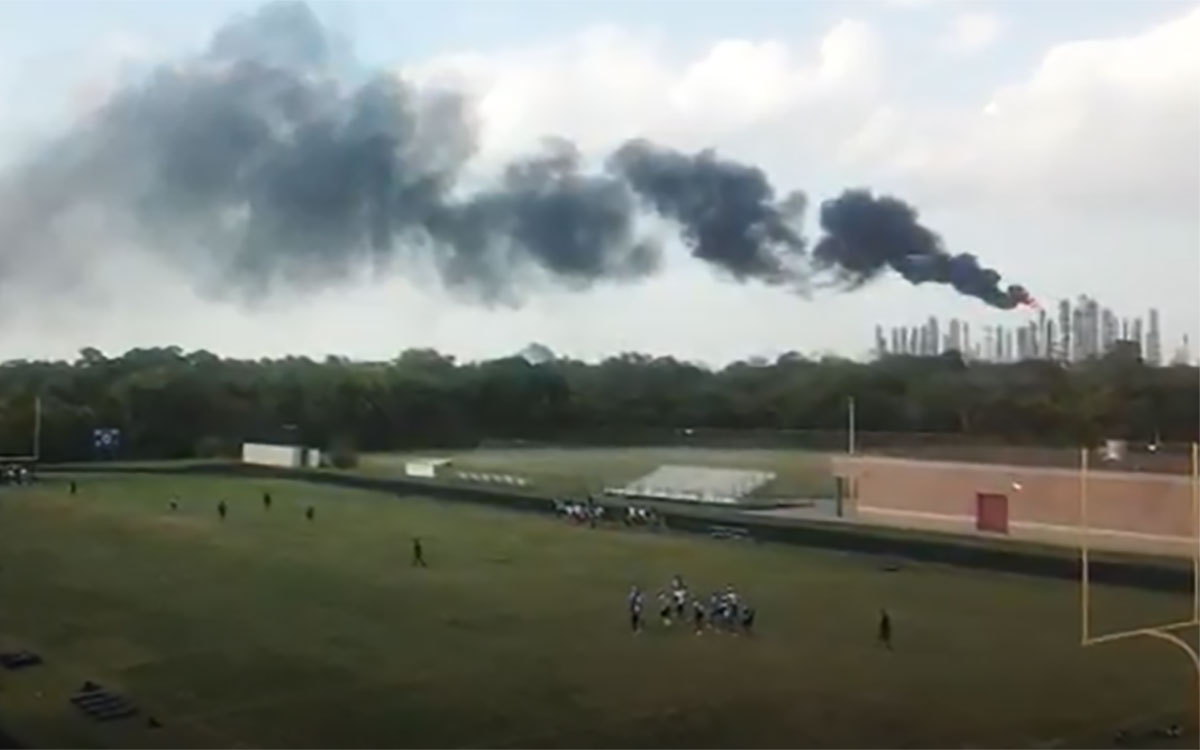Last week, I witnessed a huge flare from a nearby chemical facility in Houston. For more than 24 hours, it spewed massive plumes of black poisonous smoke over the largely Latinx neighborhood of Manchester, just four miles from where I live. This wasn't the first time it has happened, but it reminds me why I've fought for a cleaner, safer, and healthier environment for my community since I was young. I believe no matter your citizenship status, what zip code you live in, or how much money you have, we all deserve clean air to breathe, clean water to drink, and a healthy environment to thrive in.
This is what environmental racism looks like: Multiple chemical fires, explosions, and flaring from facilities owned by companies like Exxon, Valero, ITC, and TPC that leave a toxic cloud over my community. Thankfully, environmental justice champions in Congress have introduced bold national legislation—the Environmental Justice for All Act—to protect communities across the country from being turned into environmental sacrifice zones.
With a new year and a new Congress just around the corner, we must show that there is strong support for this critically important bill for justice and the environment.
For decades, polluting industries—oil refineries, fracked gas storage and export facilities, chemical and plastics production plants, and more—have profited off the suffering of my neighbors and my community. In this area of southeast Houston known as the Houston Ship Channel, there are thousands of polluting facilities and storage tanks. And the pollution is only getting worse.1 One industry, Valero, has been emitting hydrogen cyanide, a chemical used in war to commit crimes against humanity.2 This pollution makes people sick. In Houston, we have increased rates of asthma and other respiratory illnesses, diabetes, hypertension, and cancer.
To make things worse, all of these polluting industries make us more susceptible to other threats like COVID-19, hurricanes, and other extreme weather. My neighbors with respiratory problems caused by the pollution are also the most at-risk group for COVID-19, leading to more hospitalizations and, frighteningly, more deaths.3 When hurricanes roll this way, bringing intense flooding—like Hurricane Harvey did in 2017—the dangerous chemicals of nearby processing plants leach into the flood water and our air, further poisoning us and amplifyimg the other dangers of a hurricane.4
It's infuriating because it’s not my fault that I live next to such polluting industries. These dangers compound themselves in my majority Latinx community. Our only preexisting condition is a polluted environment.
We can make communities like mine across the US better. Tell your members of Congress: No one is disposable. No one should live in an environmental sacrifice zone.
The legacy of racism in private and public policy decisions means communities of color have become a sacrifice zone for industries' profits—making us sick and making the climate crisis worse. The whole system is perpetuated by overwhelmingly white people in power (corporate executives and elected officials) who live in affluent Houston suburbs not affected by this pollution. It's a system based on racism. Corporate polluters see communities like mine as lesser, making it seem OK to pollute and create environmental (and human) disasters. In short, racism is killing my community—and the planet.5
There is only one way to protect my communities from all of these pollutants, and that’s to confront the cumulative impact of these toxic dangers. That's why environmental justice champions in the US House and Senate released the Environmental Justice for All Act earlier this year to immediately address these systemic challenges, including centering policies to address cumulative impacts.
The Environmental Justice for All Act aims to achieve environmental justice, health equity, and climate justice for all underserved communities. It would strengthen existing laws like the National Environmental Policy Act (NEPA) to meaningfully consider the voices of Black, brown, and Indigenous people and other people of color when projects are being planned and built. This bill also calls for more equitable access to the outdoors and neighborhood parks for every family, particularly communities like mine in Houston. Among many other things, it would also strengthen parts of the Civil Rights Act of 1964.6
Make sure your elected officials—your two US senators and one representative in Congress—support the Environmental Justice for All Act.
The pattern of toxic industries moving into and poisoning communities of color happens in too many places—from the Houston Ship Channel to the Mississippi Delta to the Navajo reservation to the foothills of Appalachia, and so many places in between. These environmental injustices demand stronger legislation from the federal government. It will take us all fighting together to achieve the world we want to see.
References:
1 - Watkins, Katie, "Report: Unauthorized Air Pollution In Texas Has More Than Doubled Since 2015," Houston Public Media, 10/14/2020.
2 - "Houston Community Continues Fight Against Valero For Polluting Air With Hydrogen Cyanide," Sierra Club Lone Star Chapter blog, 8/28/2020.
3 - For more on the race and class disparities of COVID-19's impact on Houston, read this piece from Bloomberg Businessweek.
4 - Mosier, Jeff, "Texas plants spewed 8 million pounds of air pollutants as Hurricane Harvey hit," Physhttps://phys.org/news/2018-08-texas-spewed-million-pounds-air.html.org, 8/18/2018.
5 - Hopkins, Hop, "Racism Is Killing the Planet," Sierra, 6/8/2020.
6 - "Following Year-Long Collaborative Effort, Chair Grijalva and Rep. McEachin Introduce Landmark Environmental Justice Legislation," Rep. Raul Grijalva, 2/27/2020. Also find the one-pager fact sheet on the legislation here.
